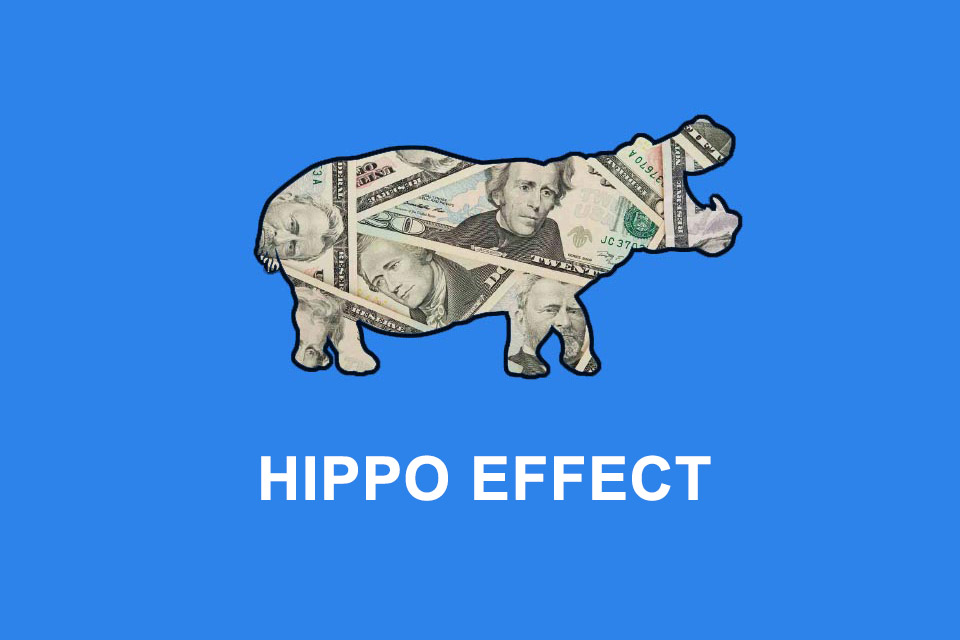What is the HIPPO Effect?
Smartpedia: The HIPPO effect describes a cognitive bias according to which the opinion of the highest paid person receives more attention.
HIPPO Effect Definition
HIPPO is an apronym and stands for Highest Paid Person’s Opinion. The effect states that the opinion of the highest paid person is given more consideration in a decision because it has a higher value per se. The value of the opinion is thus linked to the salary of the person expressing said opinion. The higher the salary, the more important the opinion. Or in other words: “What is done is what the person with the highest salary says”.
As a term, the HIPPO effect was probably first used by Avinash Kaushik in 2007 in his book “Web Analytics: An Hour a Day”¹. Kaushik argues that the effect occurs especially when there is no valid data that significantly determines a decision. Evidence-based and/or collaborative decision-making formats are therefore readily cited as an antidote in various publications.
Who is the HIPPO?
This question is only seemingly easy to answer, because often it is not actually known who the person with the highest salary is. Many organisations do not communicate salaries and agree not to disclose salaries. In addition, there are situations, for example, where representatives of different departments of a company or several companies cooperate with each other – here, too, it is unclear who the HIPPO is. However, this is not important for the HIPPO effect, which is based on the so-called “authority bias”. People have a tendency to attribute greater importance to the opinion of an authority and to be more strongly influenced by it. This cognitive bias was first documented by Stanley Milgram, a US psychologist in 1963.²
This gives rise to some considerations:
- The HIPPO is thus often the person who is positioned highest within a hierarchy. If, for example, a department meets for a meeting, the head of the department is the HIPPO. If a head of department attends the meeting, he or she is the HIPPO. In other words, the HIPPO can be read from an organisation chart.
- The HIPPO effect may be temporary.
- The effect can also occur when representatives of different companies meet, regardless of whether they cooperate in partnership or are in a client-contractor relationship.
Antidote to the HIPPO effect
Fact-based decision-making techniques – e.g. Evidence-Based Management – are often mentioned as an antidote to the HIPPO effect. These and similar techniques do indeed help to make decisions in projects or developments collectively. But what happens when the person with the highest salary or the most important job title likes to make decisions himself or herself or wants to have the last word? Here, other antidotes can help:
- an iterative approach, e.g. in the development of pretotypes, prototypes or minimum viable products, provides feedback to confirm or refute the HIPPO’s opinion.
- the use of established practices and principles, such as in clean code development.
- collaborative formats that encourage an exchange of views regardless of the positions of the participants such as braindumping.
- the explicit search for win-win situations in the direction of one’s own organisation and also in the direction of customers and users.
- the active use of lessons learned.
- the establishment of governing bodies.
But what happens if even these antidotes do not provide a remedy? Then there are probably only three options left:
- the conscious confrontation with the HIPPO,
- clearly naming the HIPPO effect and the authority bias, and
- the naming of possible consequences.
What are the possible consequences of the HIPPO effect?
The consequences of the HIPPO effect can be manifold. For example, there is a danger that
- the findings from market surveys, stakeholder analyses and reviews are negated,
- projects are set up incorrectly,
- objectives are defined and formulated subjectively,
- priorities are set incorrectly,
- good practices are ignored,
- decisions are made incorrectly, or
- products are developed past customer needs.
In addition, the motivation to work together in an organisation can decline, the self-management of teams can suffer, silo mentality can increase or staff fluctuation can rise. HIPPO can therefore cause great damage to an organisation.
But there is also good news about the HIPPO effect: it does not necessarily have to be negative. This can easily be observed when the person with the highest salary, for example, is trying to
- interpret his or her role as that of a servant leader,
- bring about change within an organisation for the benefit of the employees,
- create democratic structures,
- increase transparency,
- promote self-organisation and self-management, or
- live a culture of trust.
In other words, the possible consequences of the HIPPO effect depend on the HIPPO in each individual case.
Do you think this effect can also be observed in other areas of life, e.g. when in sport the captain of a football team is always interviewed or in politics a person in office is asked to powerfully speak out?
Notes:
[1] Avinash Kaushik: Web Analytics: An Hour a Day
[2] Stanley Milgram: Behavioral Study of obedience. The Journal of Abnormal and Social Psychology.
The effect is sometimes also called the HIPPO principle.
If you like the article or would like to discuss it, please feel free to share it in your network. And if you have any comments, please do not hesitate to send us a message.
And here you will find additional information from our Smartpedia section:



